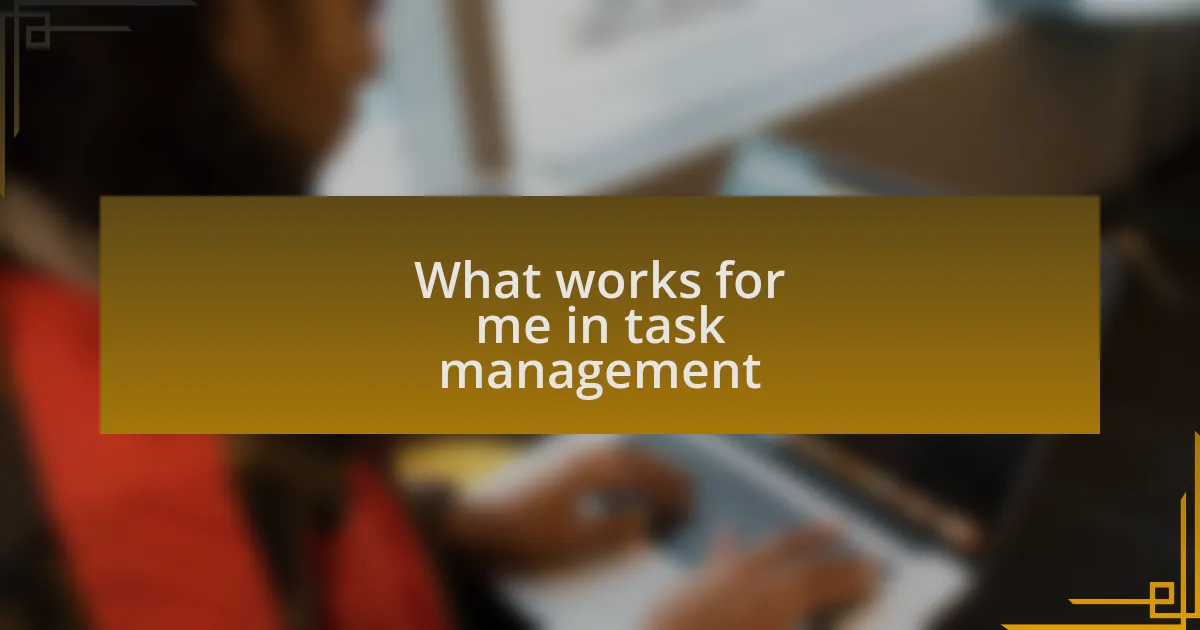Key takeaways:
- Effective task management enhances productivity through prioritization and structured approaches.
- Utilizing digital task management tools can significantly reduce cognitive load and improve organization.
- Regular reviews help maintain alignment with goals and foster a sense of accountability.
- Implementing techniques like the Pomodoro Technique and setting clear work boundaries prevents burnout and enhances focus.
Author: Liam Harrington
Bio: Liam Harrington is an acclaimed author known for his captivating blend of literary fiction and psychological thriller. Born and raised in the Pacific Northwest, he draws inspiration from the region’s lush landscapes and intricate human connections. With a degree in English Literature from the University of Washington, Liam has published several bestselling novels, earning accolades for his intricate plots and rich character development. When he’s not writing, he enjoys exploring the outdoors and uncovering hidden stories in everyday life. Liam currently resides in Seattle with his partner and their two spirited dogs.
Understanding task management
Understanding task management is essential for enhancing productivity and ensuring that projects run smoothly. Reflecting on my own experiences, I remember a time when juggling multiple tasks felt overwhelming. It was only after I adopted a structured approach, breaking down projects into manageable steps, that I truly began to see progress.
I’ve discovered that task management isn’t just about organizing tasks; it’s about prioritizing them effectively. I often ask myself, what truly needs my attention today? This simple reflection helps me focus on high-impact tasks rather than getting lost in a sea of minor details that don’t ultimately move the needle forward.
Moreover, I sometimes think of task management as a form of self-care. When I feel in control of my tasks, I experience less stress and more satisfaction in my work. I’ve learned that a clear plan not only boosts my productivity but also enhances my emotional well-being, making it easier to stay motivated throughout my projects.
My personal task management strategies
One strategy that I find particularly effective is the use of a digital task manager. I remember when I switched from pen and paper to a task management app; it felt like a revelation. Suddenly, I had my priorities and deadlines at my fingertips, which significantly reduced the cognitive load of trying to remember everything.
Breaking tasks into smaller, actionable steps is another approach I rely on. For instance, when starting a large project, I list out individual tasks with clear deadlines. This makes daunting projects feel more achievable. Have you ever stared at a big task and thought, “Where do I even start?” By compartmentalizing my work, I can celebrate small wins along the way, which keeps my momentum going.
Lastly, I’ve realized the importance of regular reviews in my task management routine. Every week, I set aside time to reflect on what I accomplished and what can be improved. It’s almost like checking in with myself to ensure I’m still aligned with my goals. Does this resonate with you? By making adjustments based on my reflections, I cultivate a sense of accountability and growth in my task management journey.
Tips for improving task management
One tip that has transformed my task management is prioritizing tasks by urgency and importance. I learned this the hard way when I found myself overwhelmed, focusing on tasks that didn’t really matter. Now, at the start of each day, I identify the top three tasks that will drive the most impact. By concentrating my efforts there, I often clear my plate faster than I think I can. Have you ever felt the thrill of checking off essential tasks?
Another powerful technique I’ve adopted is the Pomodoro Technique—this approach has genuinely enhanced my focus. I remember struggling to concentrate for long stretches, but now I work in 25-minute bursts followed by a 5-minute break. It’s amazing how such a simple structure can refresh my mind and maintain my energy levels. This method has turned long, tedious work sessions into manageable chunks that I can power through with enthusiasm.
Lastly, I emphasize the importance of setting clear boundaries around task and project times. For instance, I used to let tasks bleed into my personal time, which led to burnout. By scheduling specific work hours and sticking to those, I’ve gained back precious moments for relaxation and hobbies. Do you protect your personal time? I believe it’s essential, not just for productivity but for overall well-being. Balancing work and personal life creates space for creativity and unwinding, which ultimately makes me more effective in my task management.
